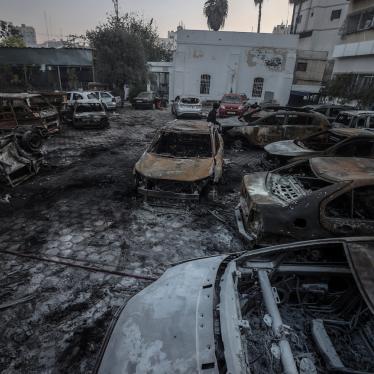Last month Human Rights Watch published a report detailing the systematic use of torture against detainees in Aceh by Indonesian security forces. The military response to the allegations in the report ranged from anger and defiance to, in some quarters, concern and an interest in uncovering the truth.
Maj. Gen. Sudrajat, Director-General of Defense Strategy at the Indonesian Ministry of Defense, told the press that Human Rights Watch's accusations were baseless, but also stated that "if there is proof of such torture, the Indonesian Ministry of Defense will take stern measures against personnel who have allegedly tortured GAM prisoners."
Human Rights Watch stands by the assertions made in the report. We welcome the decision to investigate the claims further, so long as the investigation is genuine, impartial and, if perpetrators are identified, appropriate disciplinary measures and prosecutions follow. This would be a step in the right direction, but more can definitely be done.
Based on experience in Indonesia and other parts of the world, Human Rights Watch has found that armed forces rarely seriously investigate and punish war crimes committed by their own soldiers. This is as true for professional armies as well as unprofessional ones, as is evident by the U.S. military's response to allegations of torture in Iraq and Afghanistan.
Prior to the publication of photos of torture at Abu Ghraib prison, the U.S. military conducted at best half-hearted investigations into reports of abuse of detainees, endlessly delayed others, and any punishments handed out were inconsequential.
Even after the Abu Ghraib photos received worldwide attention, U.S. military criminal investigations focused only on low-level soldiers, while senior military and civilian officials have not been seriously investigated.
If the Indonesian government is serious about addressing torture in Aceh it should establish an independent investigation team that includes representatives from Indonesia's National Commission on Human Rights, Komnas HAM. The government should invite the United Nations Special Rapporteur on Torture and Cruel, Inhuman or Degrading Treatment or Punishment to investigate and report on these allegations.
It should also start implementing the detailed recommendations made by the Committee Against Torture in November 2001 on how to address and eradicate the practice of torture in Indonesia. Sadly, torture allegations in Indonesia are nothing new.
Indonesia's new President Susilo Bambang Yudhoyono should join the recent military statements in condemning torture. Yudhoyono has already told the press that he would spend his first 100 days in office focusing on domestic issues, with the ongoing conflict in Aceh as one of his first priorities. A good first step would be for him to make a public statement and commitment that torture is unacceptable and that perpetrators will be punished.
Indonesia's Military Police chief Maj. Gen. Ruchyan will reportedly lead the newly established team to probe the allegations made in the report. He has publicly stated that he would start by trying to find and question the prisoners interviewed by Human Rights Watch.
While Human Rights Watch would be pleased to co-operate with an independent and objective investigation, we are concerned that the military is more interested in punishing prisoners who spoke out about their ill-treatment than addressing the problem. A better course of action would be to go to Aceh to assess detention conditions. Human Rights Watch will continue to monitor prison conditions in Indonesia to ensure that prisoners there suffer no repercussions for simply telling the truth.
Human Rights Watch believes that an independent and impartial investigation team will come to the same conclusions as our report about the practice of torture in Aceh's detention facilities. In fact, the best way for the Indonesian government, military and police to dispel ongoing doubts and concerns about human rights violations in the province will be to open up access to the province so that independent organizations can monitor the human rights situation, which will act as a deterrent to future abuses.
Sam Zarifi is Deputy Director of the Asia Division of Human Rights Watch.







